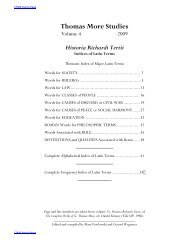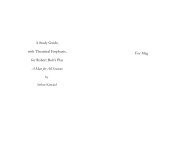life of john picus earl of mirandola - The Center for Thomas More ...
life of john picus earl of mirandola - The Center for Thomas More ...
life of john picus earl of mirandola - The Center for Thomas More ...
You also want an ePaper? Increase the reach of your titles
YUMPU automatically turns print PDFs into web optimized ePapers that Google loves.
All cunning and<br />
knowledge in learning<br />
abounded in J. Picus.<br />
J. Picus his own<br />
master<br />
[63]<br />
Wit, memory,<br />
substance, study,<br />
worldly contempt<br />
14 <strong>Thomas</strong> <strong>More</strong>’s Life <strong>of</strong> John Picus<br />
cognition <strong>of</strong> philosophy; some man hath read the inventions <strong>of</strong> the<br />
old philosophers, but he hath not been exercised in° the new schools 1 ;<br />
some man hath sought cunning, as well philosophy as divinity, <strong>for</strong><br />
praise and vainglory and not <strong>for</strong> any pr<strong>of</strong>it or increase <strong>of</strong> Christ’s<br />
Church ∆2 . But Picus all these things with equal study hath so received<br />
that they might seem by heaps as a plenteous stream to have flowed<br />
into him. For he was not <strong>of</strong> the condition <strong>of</strong> some folk (which to be<br />
excellent in one thing set all other aside) ∆3 but he in all sciences pr<strong>of</strong>ited<br />
so excellently that which <strong>of</strong> them soever ye had considered in him,<br />
ye would have thought that he had taken that one <strong>for</strong> his only study.<br />
And all these things were in him so much the more marvelous in that<br />
he came thereto by himself with the strength <strong>of</strong> his own wit, ⌐ <strong>for</strong> the<br />
love <strong>of</strong> God and pr<strong>of</strong>it <strong>of</strong> His Church, ¬4 without masters; so that we<br />
may say <strong>of</strong> him that Epicurus the philosopher said <strong>of</strong> himself, that he<br />
was his own master. 5<br />
⌐ Five Causes that in so Short Time brought him to so Marvellous Cunning.<br />
¬ To the bringing <strong>for</strong>th <strong>of</strong> so wonderful effects in so small time,<br />
I consider five causes to have come together: first, an incredible wit;<br />
secondly, a marvellous fast° memory; thirdly, great substance, by the<br />
which, to the buying <strong>of</strong> his books as well Latin as Greek and other<br />
tongues,¦ he was especially helped. Seven thousand ducats he had laid<br />
out in the gathering together <strong>of</strong> volumes <strong>of</strong> all manner <strong>of</strong> worldly<br />
literature. <strong>The</strong> fourth cause was his busy and indefatigable study. <strong>The</strong><br />
fifth was the contempt or despising 6 <strong>of</strong> all earthly things.¦<br />
2 exercised in acquainted with / 19 fast gripping, tenacious<br />
¦ 21 <strong>More</strong> naturally omits Gianfrancesco’s rettulisse mihi memoria repeto…usque ad diem illam , “<strong>for</strong> I<br />
remember he once told me that up to that day…” (CW 1:320, 321). / 24 <strong>More</strong> omits two lines<br />
<strong>of</strong> Latin: Hunc igitur si prisca illa aetas Laconum tempore protulisset, si Aristoteli credimus, divinum illum<br />
virum appellavisset , “If such a man as this had lived in the time <strong>of</strong> the ancient Spartans, they would<br />
have called him, if we may believe Aristotle, a god-man” (CW 1:320, 321). / 25 <strong>More</strong> omits ut<br />
arbitror , “I think” (CW 1:320, 321).<br />
1. new schools: Latin nova dogmata , “modern doctrines” (CW 1:318, 319).<br />
∆2. some man hath sought cunning…Christ’s Church: <strong>More</strong> significantly alters the Latin original—<br />
Scientiae ab altero hominum tantum & humanae gloriae causa, non christianae rei publicae emolumento, &<br />
divinae & humanae, quaesitae sunt, “Another has pursued learning, both human and divine, merely<br />
to gain the favor <strong>of</strong> men and <strong>for</strong> the sake <strong>of</strong> human glory, not in order to benefit the Christian<br />
community” (CW 1:318, 319).<br />
∆3. which…aside: <strong>More</strong> alters the Latin—qui non aliquo uno excellentes omnium participes sunt, “who<br />
excel in no one branch <strong>of</strong> learning but know something <strong>of</strong> all <strong>of</strong> them” (CW 1:318, 319).<br />
4. <strong>for</strong> the love…His Church: <strong>More</strong> substitutes this addition <strong>for</strong> the Latin & veritatis amore, “and the<br />
love <strong>of</strong> truth” (CW 1:320–21).<br />
5. As Rigg points out (83), Diogenes Laertius attributes this claim to Epicurus (341–270 BC) in<br />
his Vitae philosophorum (10.13).<br />
6. Both the 1510 and 1525 editions have “contempt dispising”; 1557 reads “contempt or dispising.”<br />
For possible reasons <strong>for</strong> the difference, see CW 1:218 (s.v. 63/10 dispising).<br />
5<br />
10<br />
15<br />
20<br />
25











